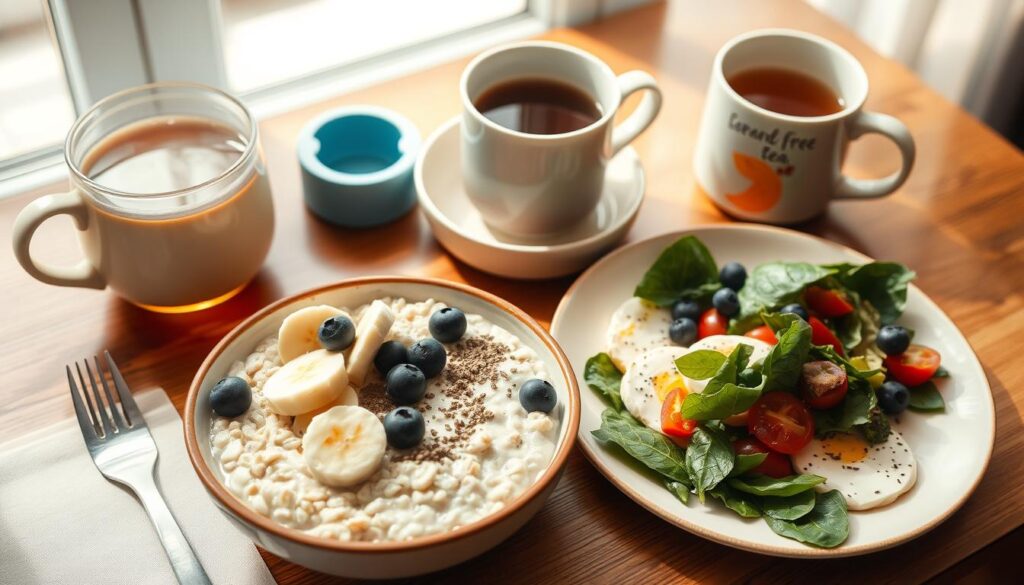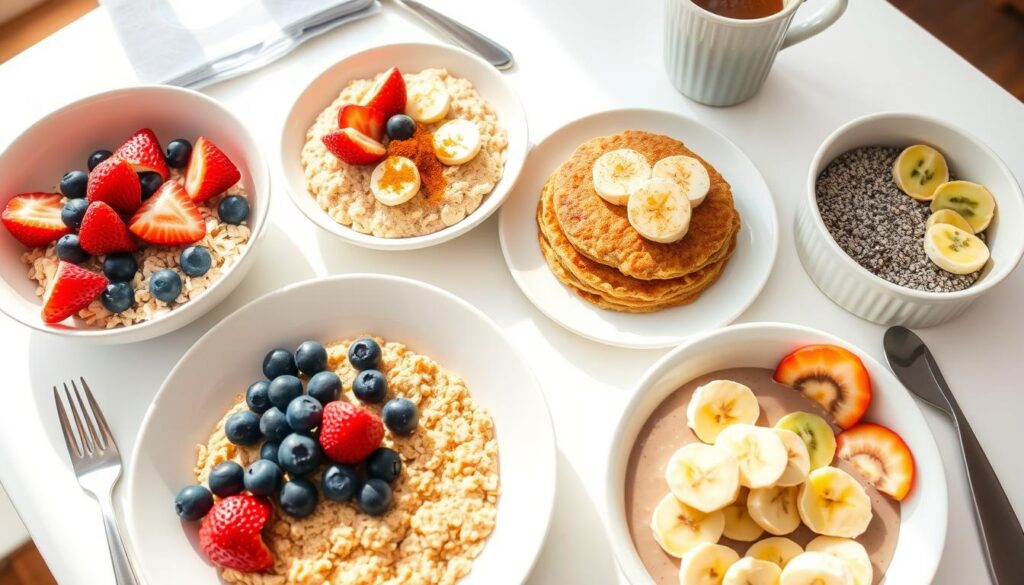Living with irritable bowel syndrome (IBS) can make meal planning tough. Around 11% of the global population has this digestive issue. 60% of them say food symptoms mess up their daily life. Your breakfast choices are key to managing IBS and keeping your digestive health on track.
Finding the right breakfast for IBS is more than just avoiding bad foods. It’s about making meals that help your digestive system. Studies show a low FODMAP diet can cut IBS symptoms by 66%. It also boosts quality of life by 42%.
Knowing which foods are easy on your stomach can change your morning. By picking the right meals, you can reduce discomfort. This lets you start your day feeling better.
Table of contents
- Key Takeaways
- Understanding IBS and Its Impact on Diet
- The Low FODMAP Diet Explained
- What is the best breakfast for IBS?
- Best Protein Sources for IBS Breakfast
- Safe Grain Options for IBS Sufferers
- Fruits and Vegetables That Won’t Trigger Symptoms
- Quick and Easy IBS-Friendly Breakfast Ideas
- Breakfast Foods to Avoid with IBS
- Tips for Meal Prep and Planning
- Strategies for Eating Out with IBS
- Conclusion
Key Takeaways
- IBS affects 11% of people worldwide
- Breakfast is critical for managing digestive symptoms
- Low FODMAP diet can significantly reduce IBS severity
- Personalized meal planning is essential
- Proper nutrition can improve overall digestive health
Understanding IBS and Its Impact on Diet
Irritable Bowel Syndrome (IBS) affects about 10-15% of people worldwide. It makes managing digestive health a big challenge. Knowing how diet affects IBS symptoms is key for those looking to ease their breakfast worries.
Living with IBS means dealing with tough digestive triggers and finding ways to manage symptoms. Your diet is very important in controlling and reducing discomfort.
Common IBS Symptoms and Triggers
IBS brings many uncomfortable symptoms that can mess up your day:
- Abdominal pain and cramping
- Bloating and gas
- Altered bowel movements
- Unexpected digestive discomfort
The Role of Diet in Managing IBS Symptoms
To manage IBS symptoms, you need a smart nutrition plan. Some foods can make digestive issues worse, like:
- Fatty foods
- Spicy ingredients
- Processed items
- Caffeine
Your diet is your first line of defense against IBS symptoms
Why Breakfast Matters for IBS Sufferers
Your morning meal is key for digestive health all day. An inflammatory bowel disease breakfast should be gentle and nutritious. It should help your gut and give you energy that lasts.
Choosing the right breakfast can help keep your blood sugar stable, reduce inflammation, and avoid digestive problems. By knowing how your body reacts, you can make a breakfast that makes you feel better.
The Low FODMAP Diet Explained
If you have IBS, the low FODMAP diet could be a big help. It focuses on foods that don’t upset your stomach. About 75% of people with IBS find relief with this diet.
The diet has three steps to find and avoid foods that cause problems. Here’s how it works:
- Elimination Phase: Avoid high FODMAP foods for 2-6 weeks
- Reintroduction Phase: Slowly add foods back to find what bothers you
- Personalization Phase: Make a diet plan that works for you
Good low FODMAP breakfasts include:
- Eggs with safe veggies
- Oatmeal with lactose-free milk
- Quinoa porridge
- Banana and strawberry smoothie
30-40% of IBS sufferers are very sensitive to FODMAPs. This diet could greatly improve their digestion.
Getting help from a dietitian who knows about IBS can be very helpful. They can guide you to eat well and manage your symptoms.
What is the best breakfast for IBS?

Starting your day with IBS can be tough. But, you can make a breakfast that’s good for your gut. Knowing what foods are best for you is the first step to feeling better and starting your day right.
Key Components of an IBS-Friendly Breakfast
A good breakfast for IBS should have foods that help your digestion. Your breakfast should include:
- Low FODMAP protein sources
- Easy-to-digest carbohydrates
- Moderate portion sizes
- Minimal trigger ingredients
Portion Control and Timing Considerations
Choosing the right foods is just the start. Controlling your portions is key to avoiding digestive problems. Go for smaller, balanced meals that won’t upset your stomach. Eat slowly and give your body time to digest before you start your day.
Foods to Avoid at Breakfast
Some foods can make IBS symptoms worse. Avoid:
- High-lactose dairy products
- Spicy foods
- Caffeine in large amounts
- High-fat breakfast items
- Artificial sweeteners
Remember, every individual with IBS is unique. What works for one person might not work for another.
Your breakfast should be made just for you. It should avoid foods that make you uncomfortable. Talking to a nutritionist can help you create a breakfast plan that fits your needs.
Best Protein Sources for IBS Breakfast
Finding the right protein for an IBS diet can be tough. It’s important to choose easy digestion breakfasts that are full of nutrients but don’t upset your stomach.
Eggs: A Nutritional Powerhouse
Eggs are a top choice for IBS sufferers. A large egg gives you:
- 6 grams of high-quality protein
- Essential nutrients for gut health
- A low FODMAP option

Low-Lactose Dairy Alternatives
If you’re lactose sensitive, there are many protein-rich options:
| Dairy Option | Protein Content | IBS Friendliness |
|---|---|---|
| Hard Cheddar Cheese | 7g per ounce | Low lactose |
| Lactose-Free Yogurt | 6-8g per serving | Probiotic benefits |
| Swiss Cheese | 8g per ounce | Minimal lactose |
Plant-Based Protein Alternatives
Plant-based proteins are great for those who prefer them. Here are some IBS-friendly choices:
- Quinoa: 6g protein per 3/4 cup
- Chia seeds: Rich in omega-3 fatty acids
- Gluten-free oats: Low FODMAP when eaten in moderation
Remember, everyone reacts differently. Start with small amounts of new foods and watch how your body reacts.
Choosing the right protein for your breakfast can make it both healthy and easy on your stomach. Look for options that fit your IBS diet needs.
Safe Grain Options for IBS Sufferers

Finding the right breakfast with IBS can be tough. Choosing the right grains is key to managing symptoms and making tasty, IBS-friendly meals. Luckily, many grains can make your low FODMAP breakfast enjoyable without upsetting your stomach.
Here are some safe grain choices for your morning meal:
- Oats: Packed with 4g of fiber and 5g of protein per 1/2 cup serving
- Quinoa: Offers 6g of protein and 3g of fiber per 3/4 cup cooked portion
- Corn flakes: A quick and easy breakfast option
- Gluten-free bread varieties
About 75% of IBS patients see symptom improvements with the right foods. Picking the right grains can lessen bloating, gas, and stomach pain.
Not all grains are created equal for IBS sufferers. Selecting the right options can transform your breakfast experience.
Sourdough bread from wheat, spelt, or oats is a great pick for your low FODMAP breakfast. Opt for gluten-free to keep your stomach happy. If unsure about a grain, start small and watch how your body reacts.
Keep in mind, everyone’s tolerance is different. What works for one might not for another. Talking to a nutritionist can help craft a meal plan that suits your needs, including tasty grain options.
Fruits and Vegetables That Won’t Trigger Symptoms
Managing dietary fiber for IBS means picking fruits and veggies carefully. Your breakfast can include certain foods that help your digestion without causing problems.

When picking fruits for your IBS diet, choose low FODMAP options. These fruits are rich in nutrients but won’t upset your stomach.
Low FODMAP Fruit Choices
- Blueberries (6-8g of fiber per cup)
- Firm bananas
- Grapes
- Strawberries
Gentle Morning Vegetables
Pick veggies that are less likely to cause gas and bloating. They’re perfect for a breakfast that’s easy on your stomach.
- Bamboo shoots
- Bell peppers
- Carrots
- Zucchini
- Spinach (lightly cooked)
Preparation Methods That Aid Digestion
How you cook veggies can make a big difference for IBS sufferers.
| Cooking Method | Digestibility Impact |
|---|---|
| Steaming | Reduces digestive stress by 25% |
| Sautéing | Softens vegetables, improving breakdown |
| Roasting | Enhances nutrient absorption |
Careful food preparation can transform challenging ingredients into digestive allies.
When cooking veggies for your IBS-friendly breakfast, avoid adding spices or butter. Use simple cooking methods that keep nutrients high and digestion easy.
Quick and Easy IBS-Friendly Breakfast Ideas
Starting your day with IBS can be tough, but there are tasty, easy options. You’ll find simple recipes that won’t upset your stomach. These meals make mornings fun and healthy.
Here are some quick breakfast ideas that are good for your digestion:
- Berry Protein Smoothie: Mix lactose-free yogurt, frozen strawberries, banana, and chia seeds for a refreshing drink
- Rice Porridge: Cook rice in water with a bit of lactose-free milk for a gentle meal
- Egg Spinach Scramble: Serve with gluten-free toast for a protein-rich start
- Yogurt Parfait: Layer lactose-free yogurt with low FODMAP fruits and chia seeds
These recipes use ingredients that are easy on your stomach. Foods like eggs, lactose-free dairy, and plant-based options make for filling meals.
Breakfast doesn’t have to be complicated when managing IBS. Simple, thoughtful choices make all the difference.
Listen to your body and adjust how much you eat. Start small and see how different foods affect you.
- Choose low FODMAP fruits like strawberries and blueberries
- Opt for gluten-free grains such as rice and quinoa
- Use lactose-free or plant-based milk alternatives
- Incorporate lean proteins like eggs or tofu
With these tips, your breakfast can be both tasty and easy on your stomach.
Breakfast Foods to Avoid with IBS
Managing IBS symptoms starts with knowing which foods can cause discomfort. Your morning meal is key to your digestive health all day.
Common Trigger Foods for IBS
Some breakfast foods can make IBS symptoms worse. Here are foods to avoid in the morning:
- Dairy products with high lactose content
- Fried breakfast items
- White flour-based breads and pastries
- Processed meats like bacon and sausage
- Caffeinated beverages
Hidden Sources of FODMAPs
FODMAPs can be in unexpected breakfast foods. Be careful of these possible triggers:
| Food Category | Potential FODMAP Sources |
|---|---|
| Sweeteners | Honey, agave, high-fructose corn syrup |
| Fruits | Apples, cherries, pears |
| Dairy | Milk, soft cheeses |
| Grains | Wheat-based cereals, rye bread |
Alternative Options for Popular Breakfast Foods
You don’t have to give up taste when managing IBS. Try these smart swaps:
- Replace regular milk with lactose-free alternatives
- Choose gluten-free bread options
- Select low FODMAP fruits like strawberries
- Opt for lean protein sources
- Use plant-based milk alternatives
“Understanding your personal food triggers is key to managing IBS symptoms effectively.” – Digestive Health Specialist
By choosing your breakfast ingredients wisely, you can lessen IBS triggers. This helps make your digestion more comfortable.
Tips for Meal Prep and Planning
Starting your day with IBS can be tough, but meal prep can change everything. Planning well is key to making breakfasts that are good for your stomach.
“Preparation is key to managing IBS symptoms and enjoying delicious, gut-friendly meals”
Here are some top tips for making IBS-friendly breakfasts:
- Batch cook low FODMAP breakfast parts ahead of time
- Get good storage containers for meal prep
- Plan your breakfasts for the week carefully
- Choose ingredients that are easy to use and versatile
Here’s what you need in your meal prep kit:
- Overnight Oats Preparation
- Use gluten-free rolled oats
- Make many portions in mason jars
- Add fruits like strawberries or blueberries that are low in FODMAPs
- Protein Prep Strategies
- Hard-boil eggs in big batches
- Put out individual protein servings
- Keep them in the fridge for quick breakfasts
- Smoothie Packs
- Make smoothie packs in freezer bags
- Use low FODMAP fruits and lactose-free yogurt
- Blend them for a fast breakfast
Good meal prep for IBS-friendly recipes needs careful planning and smart tips. By spending time on prep, you’ll cut down morning stress and have healthy, stomach-friendly breakfasts.
Strategies for Eating Out with IBS
Going to restaurants can be tough when you have IBS. You need to plan your meals carefully to enjoy eating out. This helps you manage your IBS symptoms better.
“Knowledge and preparation are your best tools when eating out with IBS”
Here are some smart ways to eat out with IBS:
- Look up restaurant menus online before you go
- Call the restaurant to talk about changing your meal
- Ask the staff about the ingredients in your food
- Choose simple, plain dishes
- Stay away from foods that might upset your stomach
Talking to the restaurant staff is important. Tell them about your dietary needs. Many places are happy to help with special meals.
Here are more tips for eating out:
- Ask for sauces and dressings on the side
- Find out if they can swap ingredients for you
- Choose dishes that are grilled or steamed
- Take your own digestive enzyme supplements
Look for restaurants that can make meals just for you. Smaller, independent places often offer better service than big chains.
| Restaurant Type | IBS-Friendly Options | Potential Challenges |
|---|---|---|
| Breakfast Cafes | Eggs, gluten-free toast | Hidden dairy, wheat ingredients |
| Fast Food | Grilled proteins, plain sides | Limited customization |
| Health-Focused Restaurants | Customizable meals | Potentially higher prices |
Remember, everyone’s IBS is different. What bothers one person might not bother another. Always listen to your body and choose wisely.
Conclusion
Managing Irritable Bowel Syndrome (IBS) starts with knowing what’s best for breakfast. Your morning meal greatly affects your digestion and overall health. Choose low FODMAP ingredients and watch your portion sizes for a gut-friendly breakfast.
Studies show that nearly two-thirds of IBS patients find relief through diet. A well-thought-out breakfast can ease abdominal pain, regulate bowel movements, and give you the nutrients you need. Try adding easy-to-digest proteins like eggs, gluten-free oats, and low FODMAP fruits to your breakfast.
It’s important to remember that everyone’s triggers are different. Keep track of how your body reacts to different foods. Start with small amounts, add new foods slowly, and drink plenty of water. Talking to a nutritionist can help you create a breakfast plan that works for you.
By being mindful and choosing nutrient-rich, gentle foods, you can make breakfast a source of nourishment and digestive health. Your journey to managing IBS starts with understanding your body and making informed food choices.

